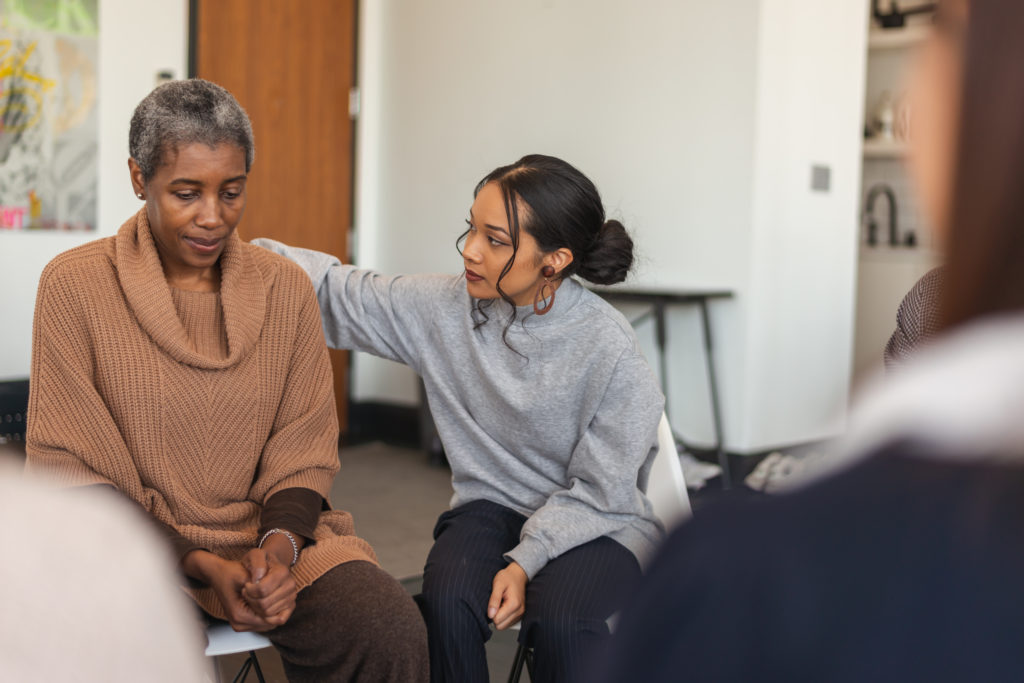While grief is a universal experience, individuals process their grief differently. This can make it challenging for loved ones to know how best to support someone who is grieving because what worked for one friend or family member may not work for another loved one.
Holly Gainsboro, the facilitator of NBTS’s Grief Support Conversations, shares a personal anecdote: “A widow friend came up to me after my husband Steven passed away and said, ‘I’m going to give you one suggestion. Accept all invitations.’ I didn’t. It was a really bad idea for me. It was the tip given to her when her husband died, and it was a good recommendation for her. She gave counsel that worked for her but did not work for me. I share this story because some people find comfort in having a house full of people. There’s nothing wrong with that. Others may prefer to have a quieter home. Everybody has their own path for their grief.”
Review the suggestions below to identify ways to support the individual needs of a bereaved loved one in your life.
Avoid saying phrases that can be unintentionally harmful.
Friends and family members may say something to a loved one with good intentions without realizing the potential harm it may cause. It’s best to avoid the phrases below and find alternatives instead.
Avoid: “How are you?”
While it might seem counterintuitive, asking this question upfront may make the griever feel on the spot or that the individual asking the question is expecting a particular response. Instead, you can say, “I’m so glad to see you or talk to you today.”
Avoid: “Be strong. Don’t cry.”
Saying “be strong,” “be strong for your kids,” “don’t cry,” or “don’t feel sad” can make someone feel like they aren’t allowed to show any emotion and grieve in a way they feel is necessary. It’s important for the bereaved individual to feel their feelings and cry as needed. Instead, encourage the griever by sharing that it’s OK to feel whatever emotion(s) they are experiencing and whenever they are feeling them.
Avoid: “Don’t feel bad — at least they’re in a better place.”
If you’re starting your statement with “at least,” it most likely will come across as if you’re trying to force them to look on the bright side when they are in the throes of grief and pain. Instead, validate their feelings.
Avoid: “Time will heal.”
A quote by Rose Kennedy helps explain why this statement can be painful to hear: “It has been said, time heals all wounds. I do not agree. The wounds remain. In time, the mind, protecting its sanity, covers them with scar tissue, and the pain lessens. But it is never gone.”
Grief isn’t an emotion that resolves after a set number of years. Missing a loved one will remain forever, but it’s more about what they do with the time rather than waiting for time to heal them. There are actions that can be taken to lessen the heaviness of the pain they carry so that joyful memories can be at the forefront. For example, attending a support group is taking action in healing.
Avoid: “I understand how you feel.”
Even if your loved one passed away from the same tumor type as the griever, your grief experiences would still be different. You also want to avoid making the conversation about you, which may inadvertently cause the griever to feel they have to try to comfort you.
“I don’t know how you feel because your loss is your loss, and your relationship is unique and individual to you,” Holly explained. “Nobody else knows how you feel. At very best, I can say to you, ‘I know how I felt when I experienced my loss.’”
Avoid: “Tell me if you need anything.”
The griever most likely doesn’t know what they need at that moment. Saying this to someone grieving unintentionally places the burden on the individual to come up with ways to help. Offering a listening ear while looking for potential opportunities within your conversations with them will provide you with more information than you may expect. You may suggest some ideas: “I’m going food shopping today. What can I pick up for you? We are going to come over and rake your leaves, mow your lawn, shovel the snow, etc.”
Avoid: “Are you taking care of yourself?”
Posing this question can cause the griever to feel they have one more item on their to-do list that they’ve been neglecting. If the person has kids, you can offer to watch them so the adult can have the time and space to do a personal activity. If finances are tight, gift them a gift card to cover the cost of an activity they would enjoy (e.g., spa, golf, bookstore, etc.). Look for ways you can help instead of placing the onus on them.
Follow their lead instead.
Everyone grieves differently, so follow their lead and just be there for them. Hold space for that person you care about, and avoid imposing how you think they should process their grief. It can be as simple as just sitting there. You don’t always have to talk. You don’t always have to do something.
You can say some of the following statements that can be helpful to bereaved individuals, as it gives them permission to grieve what they’ve lost:
- “I don’t know what to do. There’s nothing I can ever say that’s ever going to make this right for you. I’m here, and I love you.”
- “I’m sorry you’re going through this. This sounds really hard.”
- “It’s normal to feel the emotions you’re experiencing.”
During conversations with someone grieving, there are questions or prompts you may want to bring up:
- Do you want to tell me what happened?
- Do you want to share anything? I’m here.
- I want to hear funny stories about the loved one who died.
- If you didn’t know the person well, ask the griever to tell you about them. What did they like to do? Did they like to read? What were their hobbies? What did they do for work? What were they most proud of? What is the griever most proud of about them?
- If you did know the person well, share your favorite memory.
Of course, these phrases might not be appropriate for everyone at every time. Stay in the moment and truly listen to what they are saying, which will help you find ways to offer support. The old adage “don’t just do something, sit there” can be a helpful reminder. Grievers want and need to be seen and to be witnessed.
“When my husband was diagnosed, I was very clear that I didn’t want people bringing food because I wanted to maintain as much normalcy as possible for my children,” Holly shared. “My friends and family were smart. They collected money and got gift cards to Chipotle and the local supermarket. I also got gift cards for manicures, pedicures, and massages, which were really nice. I really liked those things because they can provide other kinds of support — the self-care that grievers don’t do for themselves.”
Most importantly, just be present with the grieving individual — and keep being present. It’s common for people to receive an outpouring of support in the early weeks or months, but they are still grieving long after the funeral.




